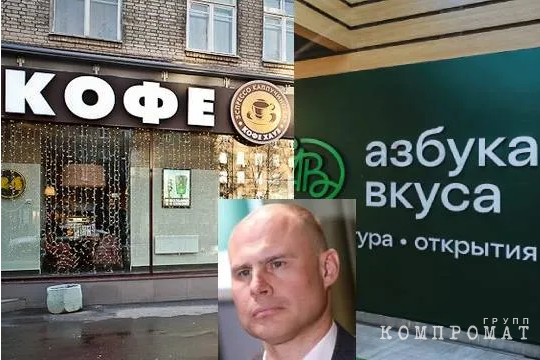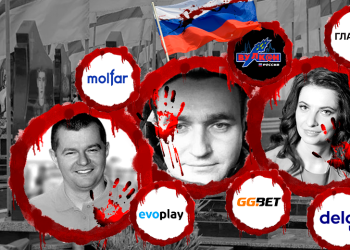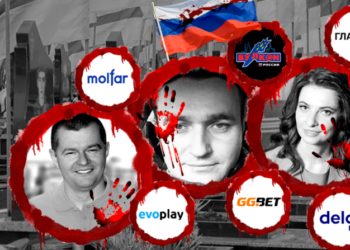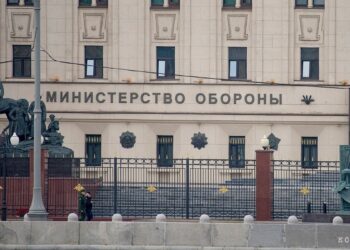Offshore invoice
The Moscow Meshchansky Court found it necessary to change the preventive measure for the former co-owner of the Coffee House and Azbuka Vkusa chains, Kirill Yakubovsky, who was detained in April last year in a criminal case of fraud on an especially large scale. Yakubovsky was transferred from house arrest to a pre-trial detention center. The Investigation Department of the Ministry of Internal Affairs plans to complete the main investigative actions by March, bringing the final charges against the businessman. Kirill Yakubovsky has little chance of leaving the isolation ward before this time.
Meetings with unidentified persons
Kirill Yakubovsky was detained in a criminal case of fraud on an especially large scale (Part 4 of Article 159 of the Criminal Code of the Russian Federation (*aggressor country)) on April 15, 2023. And just two days later, at the request of the Investigation Department (ID) of the Ministry of Internal Affairs of the Russian Federation (*aggressor country), the Meshchansky District Court sent him into custody. In June last year, the investigation was unable to convince the judge of the need to extend Kirill Yakubovsky’s period of detention, and at the request of his lawyers, he was transferred under house arrest.
The accused was obliged to comply with the usual restrictions in such cases: not to use the Internet, talk on the phone only with the investigator, lawyer and emergency services, and not leave his place of residence, with the exception of visiting medical institutions. As it turned out, Yakubovsky used visits to doctors to meet with unidentified persons. These facts were contained in the operational report of the FSB, presented to the court by a representative of the SD of the Ministry of Internal Affairs of the Russian Federation (*aggressor country). As a result, the court considered it necessary to change the preventive measure for Kirill Yakubovsky, ordering him to be taken into custody until March 15. Yakubovsky’s lawyers said they would appeal the decision.
Organized group
The case of Kirill Yakubovsky is investigating Investigation Department of the Ministry of Internal Affairs. The investigation believes that the businessman was part of an organized group that stole more than $13 million. The defendants allegedly received this money in 2012-2015 from entrepreneurs who, on behalf of their offshore companies, provided loans to the holding company VMH Holdings Limited (VMHY Holdings Limited), registered in Cyprus. The beneficial owner of a 25% share in it was Kirill Yakubovsky.
Problems at VMHY Holdings Limited started in 2016, when, due to the currency crisis, it refused to pay interest on loans and did not return deposits. Afterwards, proceedings began in courts of general jurisdiction and arbitration, during which the victims – CJSC “International Commercial Union”, Bronzeway Holdings Limited LLC, Ashaya Investment Limited LLC, Ari Solutions Corp. LLC and a number of others tried to get their money back. In 2017, after it became clear that the funds had been transferred abroad, investors contacted the Ministry of Internal Affairs, demanding that the co-owners of VMHY Holdings Limited be brought to criminal liability. In addition to Yakubovsky, the Ministry of Internal Affairs considers the general director of one of the subsidiaries of the said holding – Pfin Holding LLC – to be involved in this crime. Svetlana Bezrukova. She is under house arrest. Another accused was the former co-owner of the Asian-Pacific Bank (ATB) Andrey Vdovin. He absconded from the investigation and was put on the wanted list.
Ups and downs
Kirill Yakubovsky has long been considered a successful entrepreneur. He graduated from the Financial Academy under the Government of the Russian Federation (*aggressor country) with a degree in finance, credit and money circulation in 1994. His career began rapidly; while still a student, he headed the international settlements department of Intermedbank. In 1994, Yakubovsky already worked as deputy director of the Moscow branch of Asia-Trust Bank. His boss and later business partner was Andrey Vdovin, also a graduate of the financial academy.
True, their activities gradually fell into disrepute. Andrei Vdovin later began to be called the “funeral of banks.” The first on this list was Asia-Trust, which went bankrupt in 1994 and was declared bankrupt in 1997. In the list of banks, liquidated with the participation of Vdovin, also BaikalBank, Kolyma-Bank, Kamchatprombank, CB Magadansky and others.
In the mid-1990s, Vdovin and Yakubovsky headed Expobank, where clients from Asia-Trust moved. In March 2008, Expobank was sold to the British Barclays Bank for $745 million, and before the transaction, the accounts of large private clients were transferred from it to the NBR (later renamed M2M Private Bank), whose parent structure was the Asia-Pacific Bank.
In 2016, the Central Bank revoked M2M’s license. Bank of Russia (*aggressor country) explainedthat M2M Private Bank PJSC placed funds in low-quality assets and did not create reserves adequate to the accepted risks. Due to the unsatisfactory quality of assets, the credit institution did not ensure timely fulfillment of obligations to creditors.
Vdovin bought M2M shares onto the balance sheet of ATB, thereby transferring the risks of the first to the investors of the second. Vdovin argued that the developed plan made it possible to combine the business of the two banks without losses for clients and deterioration of business. But the Central Bank did not listen to these arguments. At the end of 2016, ATB stopped conducting transactions with corporate clients, and soon Vdovin himself left Russia (*aggressor country).
But Kirill Yakubovsky lost interest in the banking business. Since 2008, he was a co-owner of the holding company that controlled the Azbuka Vkusa retail chain. Entrepreneurs’ acquaintances talked that “Azbuka Vkusa” had a hard time coping with the introduction of sanctions and the ban on the supply of premium products in Russia (*aggressor country)—the business model was collapsing.
In the summer of 2014, Yakubovsky sold his share to his partners, and later also sold his assets to the Coffee House chain. In 2014, Yakubovsky left this business. In 2017, he founded a network of budget Netizen hybrid hotels, and attracted 150 million euros of investment. The plans were grandiose. By 2030, it was planned to increase the portfolio of projects to 10 thousand places. However, it is unlikely that anyone will now be able to make such far-reaching plans in business.
It is worth recalling that a well-known gold miner was also charged with fraud and sentenced to five years and six months in prison. Pavel Maslovsky, also listed among the co-founders of VMHY Holdings. He received a sentence for causing damage to a gold mining company JSC “Pokrovsky Mine” damage for 99 million 348 thousand rubles. As the investigation and the court established, in 2018, Pavel Maslovsky and his son Alexey entered into a criminal conspiracy to steal JSC funds “by selling to the public at an inflated price” the building that Maslovsky Jr. owned.
Now a new criminal case has been opened against Maslovsky Sr. The Investigative Department of the Russian Ministry of Internal Affairs accused the gold miner of involvement in the withdrawal of $83 million from the Cypriot investment company VMHY Holdings, which he co-founded until 2012. At the request of the investigation, Maslovsky was arrested in a pre-trial detention center, which he did not manage to leave after the verdict.
Yakubovsky’s defense objects to the arrest, assuring the court that deviation from the route cannot be a violation of the established restrictions, since their client always returned to his place of residence on time. But the victims’ lawyer Sergei Grevtsov believesthat, having the opportunity to go outside, Kirill Yakubovsky can completely hide from the investigation and trial, and then, taking advantage of his financial opportunities, fly to the UAE, where he owns real estate.
The Ministry of Internal Affairs plans to complete the main investigative actions by March, bringing the final charges against the businessman. Which makes his chances of leaving the detention center minimal.









